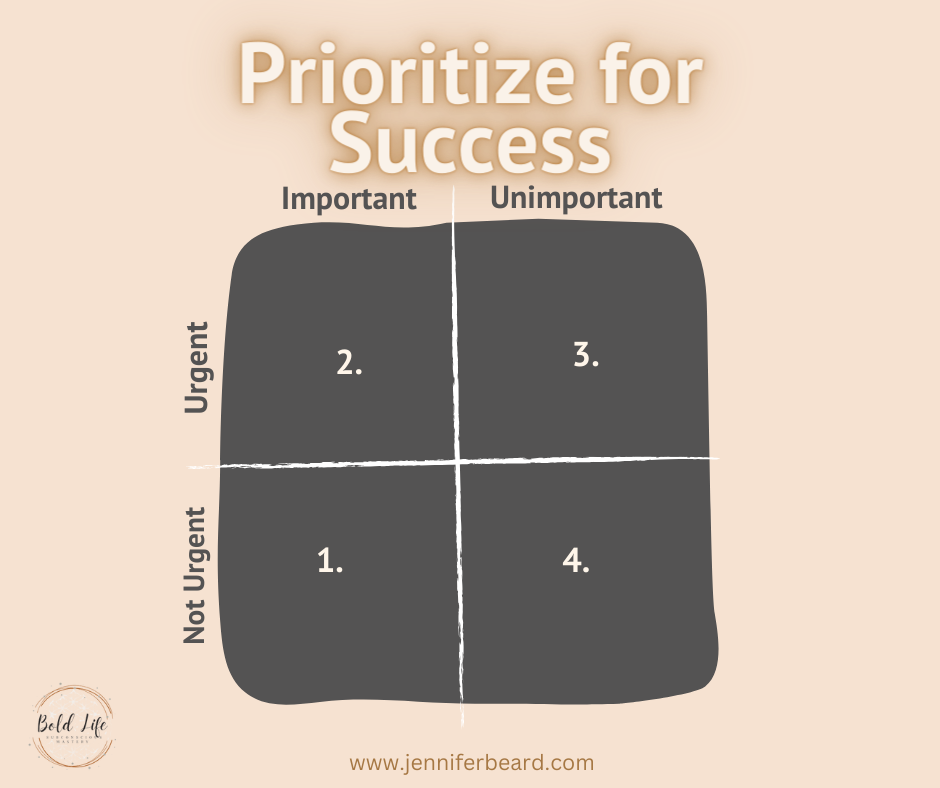Get the Guide
A simple, encouraging guide to help parents confidently transition into homeschooling, build a customized learning rhythm, and create a thriving educational experience at home.
Homeschooling 101 Starter Guide
Family
FAVE LINKS
Topics
Hi, I’m Jennifer — transformation coach, homeschooling mentor, and guide for parents ready to create a life that truly fits. I help you break through fear, align with your values, and confidently design both your child’s education and your own bold, authentic life.

As I embark on a journey to optimize my life and career, I’ve come to a crucial realization: I simply don’t have enough time in my schedule to do it all. Balancing professional demands, personal commitments, and self-care is an intricate dance, and lately, it feels like I’m stretched more often than not. The truth is, attempting to handle everything myself is not only overwhelming but also counterproductive.
It’s time to embrace a vital lesson in growth and change – the power of prioritizing tasks and enlisting help where needed. Learning to delegate is not a sign of weakness; it’s a strategic move that allows us to focus our energy on what truly matters. By letting go of control and trusting others to assist in managing various aspects of our lives, we can up-level and achieve greater success and fulfillment.
In this post, I’ll explore effective strategies for prioritizing tasks and share insights on how to free up more time and energy. By implementing these techniques, you too can focus on the activities that drive your personal and professional growth, leading to a more balanced and rewarding life. Let’s dive in and discover how prioritizing tasks can be the catalyst for the change you need to thrive.
Utilizing the Eisenhower Matrix for Effective Prioritization
To further enhance our ability to prioritize tasks effectively, we can turn to a powerful tool known as the Eisenhower Matrix. This simple yet impactful framework helps categorize tasks based on their urgency and importance, allowing us to focus on what truly matters and delegate or eliminate the rest.
What is the Eisenhower Matrix?
The Eisenhower Matrix, also known as the Urgent-Important Matrix, is a time management tool named after Dwight D. Eisenhower, the 34th President of the United States. Eisenhower was known for his productivity and ability to make tough decisions, and this matrix reflects his approach to prioritization. The matrix is divided into four quadrants:
1. Urgent and Important (Quadrant I): Tasks that need immediate attention and are critical to your goals. These are top priorities and should be handled personally and promptly.
2. Important but Not Urgent (Quadrant II): Tasks that are important for long-term success but do not require immediate action. These should be scheduled and planned for.
3. Urgent but Not Important (Quadrant III): Tasks that require immediate attention but do not significantly contribute to your goals. These are ideal tasks to delegate to others.
4. Not Urgent and Not Important (Quadrant IV): Tasks that have little impact on your overall success and can often be eliminated or minimized.

Applying the Eisenhower Matrix
By categorizing tasks using the Eisenhower Matrix, you can make more informed decisions about where to invest your time and energy. Here’s how to apply it:
1. List Your Tasks: Write down all the tasks you need to accomplish.
2. Categorize Each Task: Place each task into one of the four quadrants based on its urgency and importance.
3. Prioritize and Act: Focus on tasks in Quadrant I, schedule and plan for Quadrant II, delegate Quadrant III tasks, and minimize or eliminate Quadrant IV tasks.
Common Perceived Barriers to Getting Help
Many people believe they lack certain resources that prevent them from effectively getting help with various tasks. Here are some common perceived barriers:
1. Financial Resources “I can’t afford to hire help.” Solution: Reallocate funds from less critical areas and explore cost-effective options like part-time help or freelancers.
2. Time to Manage Help “Managing help will take more time than doing tasks themselves.” Solution: Invest time initially to set up systems and clear instructions, saving significant time in the long run.
3. Trust in Outsiders “I don’t trust strangers with my __________.” Solution: Use thorough vetting processes and rely on reputable agencies or referrals to build trust gradually.
4. Knowledge of Where to Find Help “I don’t know where to look for reliable help.” Solution: Use well-known platforms (Upwork, Care.com, TaskRabbit) and local community resources
5. Fear of Judgement “I worry about being judged for not handling my own responsibilities.” Solution: Recognize that delegating tasks is smart time management. Surround yourself with supportive individuals who understand and value the importance of delegation.
We need to remind ourselves of what we sacrifice by holding on to tasks we could delegate. We’re giving up precious time with family, missing out on potential success by not freeing up our time and energy, and losing the chance to step into the next level of our lives. Letting go of control can open doors to greater fulfillment and growth.
Achieving a Balanced, Successful Life
Implementing the Eisenhower Matrix into your daily routine helps ensure that you spend more time on activities that align with your long-term goals and values. By prioritizing effectively, you can reduce stress, improve productivity, and create a more balanced and successful life. This method, combined with the strategies for overcoming perceived barriers to getting help, can transform how you manage your time and resources, leading to greater fulfillment and achievement.
Addressing these perceived barriers and utilizing tools like the Eisenhower Matrix involves a combination of strategic planning, resourcefulness, and a shift in mindset. By understanding and tackling these concerns, individuals can more effectively leverage help, leading to improved productivity and a better work-life balance.
To get instructions on how to create this process and FREE DOWNLOADABLE TEMPLATES go here now.
Be well,
Jennifer
p.s. Stay ahead of the game and join our community! Sign up for our weekly newsletter HERE to get exclusive insights, tips, and strategies right in your inbox. Don’t miss out on the chance to elevate your journey every week.
Michigan Life Coaching, Personal Growth, and PSYCH-K®️. Taking your life to the next level and creating the abundance you deserve.
Productivity
Homeschooling
authenticity
intuition
BeLIEF CHANGE
Browse the categories
JenniferBeard.com 2025. All Rights Reserved.
17195 Silver Lake Parkway #136 Fenton, MI 48430 | PRIVACY | TERMS
Hi, I’m Jennifer — transformation coach, homeschooling mentor, and guide for those who are ready to create a life that truly fits. I help you break through fear, align with your values, and confidently design both your child’s education and your own bold, authentic life.
HAPPINESS STARTS
WITH YOU!
Get this practical guide for living a life of joy now!
Start homeschooling confidently
Get the homeschool guide
Check out our private coaching




Comments Off on How Successful People Prioritize